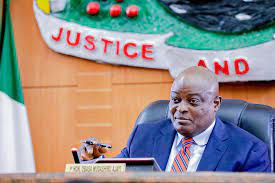For the third time within the last six months, the Senate ran into troubled waters penultimate week over unpopularity or otherwise of some of the bills being considered for possible legislations or Acts of Parliament. Taiye Odewale reports.
Social media bill
The first of such controversial bills was the one sponsored by Senator Mohammed Sani Musa ( APC Niger East ) seeking regulation of the Social Media in the country .
The Bill titled: “A bill for an Act to make provisions for the Protection from Internet Falsehood and Manipulations and for related matters, 2019 , was listed on the Senate’ s Order Paper of Tuesday, November 5, 2019 and passed for first reading .
Two weeks after, precisely on Wednesday, November 20, 2019, the bill was given second reading consideration after the sponsor made a lead debate on it and many of the Senators present that day saw reasoned in his arguments and subsequently supported his proposal with their contributions and voted favourably for the bill when eventually voice vote was called for by the President of the Senate, Ahmad Lawan.
However, three solid months after the second reading passage of the bill, the expected public hearing which ought to have been held on its provisions by the Senate Committee on Judiciary, Human Rights and Legal Matters, is yet to hold perhaps due to public outcries against it, particularly social media practitioners who are all bent in stopping its passage.
Hate speech bill
The second of such controversial bills is the one against ‘ Hate Speech or Speeches ‘, sponsored by another Senator from Niger State, Senator Aliyu Sabi Abdullahi ( APC Niger North).
Senator Abdullahi in the bill titled: “The National Commission for the Prohibition of Hate Speeches (Estb., etc) Bill 2019, seeks amongst others , death by hanging for anyone found guilty of any form of hate speech that results in the death of another person.
But since the first reading of the bill on the floor of the Senate on Tuesday, November 12, 2019, and watering down of proposed sanctions contained in the bill from death sentence to terms of imprisonment, it has not been given second reading consideration as a result of vehement oppositions against it by Nigerians.
Agency for rehabilitation of insurgents
While the Senate seems to be bidding its time for further consideration of the aforementioned bills in view of oppositions against them by Nigerians, it ran into another public outcry over a bill seeking for the establishment of an agency for the rehabilitation, de-radicalization and reintegration of ‘ repentant Boko Haram insurgents’ members into the society .
Precisely the bill sponsored by immediate past Governor of Yobe state, Senator Ibrahim Gaidam (APC Yobe East), drew backlashes from the public against the Senate, the very day, Thursday, February 20, 2020, it was passed for first reading.
The Bill titled: “National Agency for the Education, Rehabilitation, De-radicalization and Integration of Repentant Insurgents in Nigeria “, envisioned among others for provision of avenue for rehabilitating, de – radicalization, educating and reintegrating the defectors, repentant and detained members of the insurgent group in making them useful members of the society.
“Provide avenue for reconciliation and promote national security . “Provide an-open-door and encouragement for other members of the group who are still engaged in the insurgency to abandon the group especially in the face of the military pressure.
“Give the government an opportunity to derive insider-information about the insurgent group for greater understanding of the group and its inner workings.
“Help disintegrate the violent and poisonous ideology that the group spreads as the program will enable some convicted or suspected terrorists to express remorse over their actions, repent and recant their Violent ideology and re-enter mainstream politics, religion and society”.
Senator Gaidam explained further in the draft copy of the bill that if established, the agency through maintenance of open lines, will be able to gain greater understanding of both the immediate needs for combating Boko Hararn as well as tool for counter-radicalization, one of which will be educating repentant Insurgents both at home and abroad.
SERAP joins issues with NASS
But the Socio-Economic Rights and Accountability Project (SERAP), vehemently kicked against such plans few days back.
SERAP in an open letter to the President of the Senate, Ahmad Lawan, called for discontinuation of processing of the bill in the Senate forthwith.
According to SERAP in the letter dated 28th February , 2020 and signed by its Deputy Director, Kolawole Oluwadare, “The bill erodes justice and makes a mockery of the suffering of victims, and the unspeakable human tragedy, humanitarian crisis and appalling atrocities committed by the Boko Haram terrorist group.”
SERAP kicks further by saying “by calling Boko Haram members ‘ex-agitators’, the bill mocks the victims of appalling atrocities committed by the terrorist group, and is a blatant affront to victims’ dignity. ‘Repentant Boko Haram terrorists’ are not ‘ex-agitators’; they are terrorists under Nigerian and international laws.”
Pointedly it added that “Boko Haram members should not be allowed to enjoy foreign education while over 13 million Nigerian children of school age are roaming our streets.
“Alleged perpetrators of gross violations should not get the benefits at the expense of these and other deserving children. Rather than allowing perpetrators to access public funds to enjoy foreign education, the Senate should be promoting reparation for victims, to prevent future criminality and ensure the best interest of justice.”
It declared further that in line with its total rejection of the bill that “Should the Senate go ahead to pass the bill, and should the bill be supported by the House of Representatives and assented to by President Muhammadu Buhari, the Registered Trustees of SERAP shall take all appropriate legal actions nationally and internationally to challenge the legality of any such law and ensure that it is never implemented.”
It, therefore, urged the Senate President to use his leadership position to “ensure that the bill that would allow ‘repentant Boko Haram terrorists’ opportunities to access public funds to enjoy foreign education is immediately dropped, and to sponsor bills that would ensure access to justice and reparation for the victims of Boko Haram terrorist group.”
The letter
The letter reads in part: “Prioritising the education of Boko Haram members over the rights of Nigerian children to quality education is discriminatory, as it violates Nigerian constitutional provisions, international and regional human rights obligations, and will undermine national development.
“This bill serves neither justice nor the public interest. The bill also does not represent value for money for Nigerian taxpayers, especially coming from an institution whose individual member reportedly takes home about N182 million yearly, translating to N15.1 million monthly or N45.3 million quarterly.
“Internally displaced persons (IDP) camps in many parts of the country are in shambles, with people lacking access to basic necessities like food, clothing and children of victims lacking access to basic education.
“Without justice, the seeds of future criminality and militant terrorism will grow. This bill, if passed, would only lead to more terrorism and suffering.
“The Senate should focus on passing bills that would ensure access of victims to effective remedies including adequate reparation and effective prosecution of ‘repentant Boko Haram members’ rather than rewarding them with opportunities to study abroad.
“Prioritising alleged perpetrators’ rights at the expense of the victims’ rights and interests and needs, is discriminatory, illegal and unconstitutional, as it amounts to‘re-victimisation’.
“While the alleged ‘repentant Boko Haram terrorists have the right to an impartial and fair trial, they have absolutely no right to enjoy foreign education….”
Going by controversies in form of strident oppositions from Nigerians trailing the three bills, the Senate is definitely being cautious in processing them but whether it will at the end of the day, allow them to run through the entire gamut of legislative processes for possible passage or rejection, time will tell.
Quote
Prioritising alleged perpetrators’ rights at the expense of the victims’ rights and interests and needs, is discriminatory, illegal and unconstitutional, as it amounts to‘re-victimisation’.



